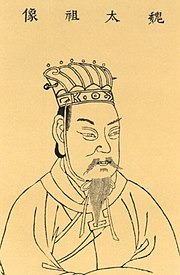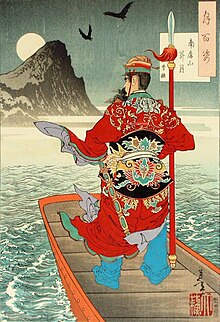Poetry of Cao Cao

Cao Cao(155–220) was a warlord who rose to power towards thefinal yearsof theEastern Han dynasty(25–220 CE) and became thede factohead of government inChina.He laid the foundation for what was to become the state ofCao Wei(220–265), founded by his son and successorCao Pi,in theThree Kingdomsperiod (220–280).Poetry,among other things, was one of his cultural legacies.
Overview
[edit]Cao Caowas an accomplished poet, as were his sonsCao PiandCao Zhi.Cao Cao was also a patron of poets such asXu Gan.[1]Of Cao Cao's works, only a remnant remain today. His verses, unpretentious yet profound, helped to reshape the poetic style of his time and beyond, eventually contributing to the poetry styles associated withTang dynasty poetry.Cao Cao, Cao Pi and Cao Zhi are known collectively as the "Three Caos". The Three Caos' poetry, together with additional poets, eventually developed into theJian'anstyle:Jian'an was theera namefor theperiod from 196 to 220.Poets of the Cao family and others continued to write and develop the poetry of this style, after the end of the Han dynasty and the subsequent founding of theCao Weistate: these were the Jian'an poets. The effects of civil strife on poetry towards the end of the Eastern Han dynasty contributed to the development of a solemn and heart-stirring tone of lament for life's ephemeral nature during the period of Jian'an poetry.
From its roots inHan poetryfolk songs, Jian'an poetry evolved into a form of scholarly poetry that is characteristic ofSix Dynasties poetry.Cao Cao and other Jian'an poets developed the characteristic Hanfu(oryuefu) poetry style deriving from folk song or ballad traditions, such as of uneven line lengths. Irregular lines became transformed into regular five-character line-length styles, very similar (and inspirational to) theshipoetry of the Tang dynasty's five-character regular line. Cao Cao has specifically been noted for his ballad-style verse, which he apparently set to music.[2]
Cao Cao also wrote verse in the older four-character per line style characteristic of theClassic of Poetry.Burton Watsondescribes Cao Cao as: "the only writer of the period who succeeded in infusing the old four-character metre with any vitality, mainly because he discarded the archaic diction associated with it and employed the ordinary poetic language of his time."[3]Cao Cao is also known for his early contributions to theShanshui poetrygenre, with his 4-character-per-line, 14-line poem "View of the Blue Sea" ( quan thương hải ).[4]
Poems
[edit]Though the Tortoise Lives Long
[edit]One of Cao Cao's most celebrated pieces, written in the old four-character line style, is titledThough the Tortoise Lives Long( quy tuy thọ ). It is one part of a four-part poem titledSteps through the Illustrious Gate( bộ xuất hạ môn hành ). It was written during theBattle of White Wolf Mountainin 207.
|
《 quy tuy thọ 》 |
Though the Tortoise Lives Long |
|
Thần quy tuy thọ, do hữu cánh thời. |
Though the tortoise blessed with magic powers lives long, |
|
Đằng xà thừa vụ, chung vi thổ hôi. |
Though winged serpents ride high on the mist, |
|
Lão ký phục lịch, chí tại thiên lí; |
An old war-horse may be stabled, |
|
Liệt sĩ mộ niên, tráng tâm bất dĩ. |
And a noble-hearted man though advanced in years |
|
Doanh súc chi kỳ, bất đãn tại thiên; |
Man's span of life, whether long or short, |
|
Dưỡng di chi phúc, khả đắc vĩnh niên. |
One who eats well and keeps cheerful |
|
Hạnh thậm chí tai! Ca dĩ vịnh chí. |
And so, with joy in my heart, |
Short Song Style
[edit]
Another of Cao Cao's most well known poems isShort Song Style( đoản ca hành ), composed in 210s.
|
《 đoản ca hành 》 |
Short Song Style |
|
Đối tửu đương ca, nhân sinh kỉ hà? |
I lift my drink and sing a song, for who knows if one's life is short or long? |
|
Thí như triều lộ, khứ nhật khổ đa. |
Man's life is but the morning dew, past days many, future ones few. |
|
Khái đương dĩ khảng, ưu tư nan vong. |
The melancholy my heart begets, comes from cares I cannot forget |
|
Hà dĩ giải ưu? Duy hữu đỗ khang. |
What can unravel these woes of mine? I know but one drink –Du KangWine. |
|
Thanh thanh tử câm, du du ngã tâm.[a] |
Collars in blue, my heart worries for you |
|
Đãn vi quân cố, thẩm ngâm chí kim. |
You are the cause of this song without pause |
|
U u lộc minh, thực dã chi bình. |
Across the banks a deer bleats, in the wilds where it eats |
|
Ngã hữu gia tân, cổ sắt xuy sanh.[a] |
Honoured guests I salute. Strike the harp! Play the flute! |
|
Minh minh như nguyệt, hà thời khả xuyết? |
Bright is the moon's spark; When can it be grasped? |
|
Ưu tòng trung lai, bất khả đoạn tuyệt. |
Thoughts of you from deep inside, never settle, never subside |
|
Việt mạch độ thiên, uổng dụng tương tồn. |
Friends drop by via a country road, the respect they pay really show. |
|
Khế khoát đàm yến, tâm niệm cựu ân. |
A long due reunion we fest, sharing past stories we possessed |
|
Nguyệt minh tinh hi, ô thước nam phi, |
Stars around the moons are few, southward the crows flew. |
|
Nhiễu thụ tam táp, hà chi khả y? |
Circling the tree round and round; on what branch shall they nest? |
|
Sơn bất yếm cao, hải bất yếm thâm. |
Mountains weary not of their height, oceans weary not of their depth. |
|
Chu công thổ bộ, thiên hạ quy tâm. |
The sage pauses when guests call, so at his feet the empire does fall![b] |
- ^abQuotes fromClassic of Poetry
- ^Originally a reference to a story of the legendaryDuke of Zhou.If guests arrived while the Duke was eating, he would spit out his food and meet them rather than have them wait for him. Later commentators praised this as a self-sacrificing attitude.
See also
[edit]Notes
[edit]References and further reading
[edit]- A. R. (Albert Richard) Davis, Editor and Introduction (1970).The Penguin Book of Chinese Verse.Penguin Books.
{{cite book}}:|author=has generic name (help) - Burton Watson(1971).Chinese Lyricism: Shih Poetry from the Second to the Twelfth Century.Columbia University Press.ISBN0-231-03464-4.
- Yip, Wai-lim(1997).Chinese Poetry: An Anthology of Major Modes and Genres.(Durham and London: Duke University Press).ISBN0-8223-1946-2
- Xiao Tong.Wen Xuan.
